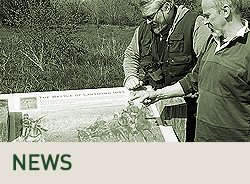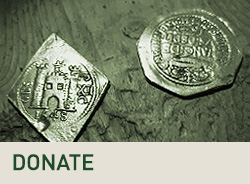The Battle
By the night of the 15th March 1322 the royal forces under Sir Andrew de Harcla had reached Ripon. Importantly, he was far better informed of the rebel army’s movements than they were of his. While at Ripon he received news from a scout or ‘spy’ that the Earl of Lancaster’s forces were on the march along the Great North Road and could be expected to reach Boroughbridge the next day.
That night Harcla marched the six miles to Boroughbridge, where the road crossed the River Ure. If he could reach and take the bridge before Lancaster arrived then he would be in a very strong tactical position. With his archers and 'pikemen' he would be able to hold a determined charge by Lancaster’s forces which, although probably outnumbered, were far stronger in heavily armoured knights and men at arms. In open country such an advantage could more than outweigh any superiority Harcla had in overall numbers but in an opposed river crossing, whether by bridge or by ford, this advantage would be removed.
Apparently unaware of the threat from the north, or at least its proximity, Lancaster reached Boroughbridge on the16th March. Indeed so poor was the Earl’s scouting that it was only once they had begun to take quarters in the town that the rebels discovered Harcla already held the bridge. Even today the crossings of the Ure are few and far between, but in the 14th century there was no real alternative for a major force than to use the crossing at Boroughbridge. With the army of the Earls of Surrey and Kent in close pursuit, retreat was not an option.
First of all Lancaster sought to negotiate with the commander of the royal forces. But, even though Harcla owed his status as a knight to Lancaster, he would not change sides. Though next year he would be executed as a traitor, as a scapegoat for the failure in the campaign against the Scots, at this point Harcla must have realised that there was little future in the rebel cause. Lancaster army was far outnumbered by the various royal forces that were in the field. There was now no alternative for the rebels but to fight for control of the bridge, or they would be caught between the two forces and would then have no hope of success.






